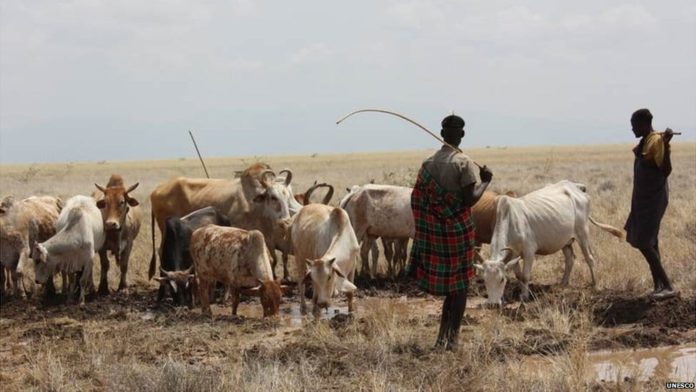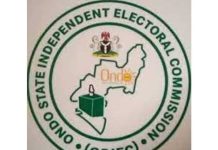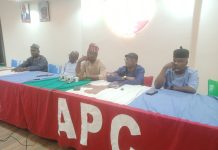
Let me first put my biases out there for my intelligent reader. I’m an herdsmen. I own a few herds of cow, on a beautiful ranch I built literally from the grounds up with a few believing young people: no one older than forty years of age: in the last three years. It spans almost forty hectares, our cattle is our work. They’re fat. They’re beautiful to behold. We recently fanned out from our base in the Middle Belt, and now have three smaller livestock farm lots in three Southwestern states. I’m proud of our work at Owonikoko Ranch & Farms. Follow us on Twitter @owonikoko.
I’m Fulani in my past life, I think ; but I speak no Fulfude nor Hausa, and my people are aboriginals from Ekiti state. I’m probably ethnologically not Yoruba. My existence predates the Yoruba, and that is a matter of historical fact: for those that know the pre-historic origins of the region we now call Nigeria. So pardon me, if I speak often like a disinterested party in the struggle for tribal supremacy that has characterized Nigeria’s post-colonial history since independence. I don’t see tribes, I see black people fighting over crumbs. How about we grow the pie? .
Read Also: Boko Haram, Herdsmen Fighting To ‘Islamise’ Nigeria, Africa – Obasanjo Claims
Ultimately, I hope at the end of this article you will become more like me. Decipher a business opportunity instead of a challenge. See a gap, instead of a hole. Get involved, instead of lamenting. Why? Because nothing, is new on the surface of the earth. Not even the challenge that behooves on us as a country. But first me we must define the challenge.
To an untrained eye, the problem of the Cattle value chain is fundamentally the issue of uncivilized pastoralists roaming rural lands and invading farms with their animals leading to clashes. Thousands of lives has been lost to these fights and clashes for years. Between 2006 and 2014, data shows over 600 people were killed in these clashes across Nigeria. From independence, we’ve lost well over 5000 people to these clashes.
Indeed, by 2016 more people died from these clashes than in the hands of Boko Haram according to SBM Intelligence — research outfit in Nigeria. The natural narrative of emboldened Fulani Herdsmen because the new President is Fulani thus took hold, forgetting that. the President’s PR may well have been taking a hit because of his own success in tackling Boko Haram that was at the doorstep of the North. Without Boko Haram to worry about, the irascible Southwest media promptly turned their attention to Fulani Herdsmen. Heck, no brown envelope. Why should they do their work of investigative journalism? Let us help them.
Further exacerbating the tension is the lack of distinction between violence caused by attacks on farmers by Herdsmen, and the attacks on Herdsmen by farmers — the later more commonly called rustling or banditry. Certainly, to many southerners — what is the difference between the Fulani Herdsmen and the Hausa farmer? Not much! They grew up on the propaganda of Hausa-Fulani as some kind of fused ethnic group when the North of Nigeria is a lot more complex than that.
Further to this, is a protein problem for Nigeria. Animals that arrive on our plates are often processed unhygienically and lack optimal nutrients and tough- having been walked long distances (some time up to 100km) before they arrive on our plate. Nigeria also pay far more per kilogram, while consuming far less per capita than she should considering her economic standing on the continent relative to others. Basically, we have a protein problem!
Nigeria is currently consuming 360,000 tons of beef a year
Read Also: Diversity, Unity And The Future By Hon. Nnenna Elendu-Ukeje
Interestingly, it is the food security angle with respect to nutrition, health, protein, jobs and employment that the true definition of the herdsmen challenge of Nigeria lies. Forget the narrative of some Fulani invading your land, the problem is the process of the meat arriving at your table. And to understand this process, you must understand the structure of the current livestock market. Hope you follow the next few paragraphs.
There are over 26 million heads of cattle in Nigeria today, valued at well over $16 billion USD according to FAO — a United Nations Agency. 90% of Nigeria’s cattle stock are imported — I mean literally walked into the country from neighboring nations of Chad, Cameroon and Niger. Most of the meat you eat are gotten from animals that were born in Central Africa Republic, Burkina Faso and Mali. Animals are born in Nigeria by chance. Imagine the Forex loss due to this, shouldn’t we look closely as we do rice and poultry?
On the consumption side, it is estimated that annual domestic and imported slaughtering is around 7.5 million cattle with a livestock value of $5bn. Nigeria is currently consuming 360,000 tons of beef a year, a volume that is predicted to rise to 1.3 million tons by 2050. In Lagos alone, data shows between 6,000 to 9,000 heads of cattle are slaughtered every day. Over 60% of beef consumption in Nigeria takes place in the six south-western states and Edo. Nigerians love their meat, we are carnivores!
Nigeria has no breeding industry
To link consumption to production, Livestock move through various markets and incur a number of trading transactions as they move from pastoralist through to the terminal market & mostly get to market emaciated. They often walk thousands of kilometers, are lost to peril and bear in mind engage well over 15 million pastoralists who will be left with no assets and no jobs if we suddenly stop this flow of goods!
Try imagine additional 15 million more people unemployed in Nigeria, and begin to process the impact of an irrational policy in the sector!
If Nigeria stops buying, there will be more need of aid for many landlocked West African countries
Beyond these, the implication of the two facets of production and consumption pattern I have summarized above for you are thus:
Nigeria has no breeding industry. Mostly what happens in Nigeria is incidental breeding. This creates a value chain capture problem. We are losing millions of jobs in the Cattle value chain to our neighbors, who essentially depend on us for their market and most valuable exports. Nigeria is the outlet market for West Africa. We are providing immense economic aid for others without realizing or arrogating it. Hence, it is no surprise that international organizations that should point these out, generally don’t. If Nigeria stops buying, there will be more need of aid for many landlocked West African countries. Fact.
Flowing from the above, the lack of breeding stock ensures we import live animals from our Northern neighbors (up to 90%) while banning bovine meat offal (processed) imports — inconsistent with international standards. Remember, you can’t bring live animals or meat dripping with blood into most countries in the world to prevent disease transmission and protect local stock. Nigeria is the reverse. This has also ensured that a lot of diseases unfounded in the agricultural industry of others happen to persist in Nigeria. This has prevented Nigeria from exporting some animals and crops to premium markets like Middle East and Europe.
The pastoral industry that grows and transports the animal from border posts to market today employs 15 million pastoralists. Any solution as such must consider the change impact of this, which is beyond jobs but also has to do with a way of life of indigenous people which is protected by international convention.
The impact of climate change and rapid urbanization, including the development of a federal capital (Abuja) right on the path of the pre-colonial grazing routes (lets remember all borders of West Africa are artificial) has ensured more pastoral to farmer contact. With this contact comes conflict. The pastoralist lives for his animal as you will if you’re civilized for your pet, and has his assets tied up in it — while the farmer lives off his subsistence farming. The land his his livelihood — and cherishes his land and crops. In competition for resources, strife happen.
When the Pastoralists arrive in the market, it arrives relatively more expensive than other places in the world. A cattle we sell for equivalent of $1000 in Nigeria, goes for a third of that price in the United States if it sells at all! They arrive also emaciated. and tough — really tough!
To make them into meat you can cook, eat and digest — Nigerian factor of disorganization reigns supreme. Animals are slaughtered in nasty and dirty Abattoirs across the land, and are chief transmitters of typhoid that kill thousands yearly while making millions sick.
Lastly, the impact of years of lack of investment in agriculture had worse impact on livestock farming than crop farmers in Nigeria. Crop farmers are easy to locate, hence even years of political intervention in agriculture no matter how half hearted always easily impacted the crop aspects of Nigeria’s agriculture. Research no matter how minimal took place and methods have improved on the crop side no matter how small. The pastoralists were harder to get to, and still do things the old fashioned way ensuring very low productivity of meat and milk. Even as the population ballooned and demand pressure rose in our urban areas.
Nigeria’s problem in the Cattle value chain is real, and is by the way self evident but also not unexpected for our current stage of development.
As is Herdsman-Farmer clash in Nigeria in 2019, so is the western cowboy and farmer clash of 1819 United States. The problem spans West Africa too, a further proof that it is not a unique ethnological struggle but only a phase in our development as a modern country. It is this optimism we must bring to tackling the challenge.
First, what we need to solve this problem is to have cooler heads prevail, drop the demagoguery and the seemingly open season of demonization. The politicization of meat also does not help. Name calling and tagging whole ethnic groups terrorists just because you hate the President is exactly not smart if you want solutions instead of knee jerk engagement. If we won’t all turn to vegetarians, then we may as well start reasoning together. There will always be the sliver of the population spoiling for fight and edging on the rest to be relevant as interlocutors who are only relevant when things scatter: but we must not give elements any room. They abound among politicians, so called activists and ethnic liberation movement jingoists. Just remember, these elements have no solutions. They’re noisemakers!
The real solution will come from real people, reaching alignment and understanding that we need one another. We need 15 million Fulani people who are Nigerians as well as great farmers to produce grains and fodder to feed their animal. Both groups have rights to earn a living and to continue to earn a living in the context of peace and security of their neighbors. And if you believe in self determination rights of ethnic groups in the UN Charter, then you’re also bound to believe in the preservation of the lifestyle of indigenous peoples especially pastoralists like the Fulani: those rights in the same document!
To my patient reader, you will agree with me that some form of transition arrangement to convert pastoralists to the breeders we lack in Nigeria is required. The obvious hybrid approach to this is self revealing. Why not create a breeding industry with pastoralists who already do it incidentally while filling the over 512,000 tons per year. gap between supply and demand for milk?
It appears to me that this is the effort that the Miyetti Allah Cattle Breeders Association of Nigeria (MACBAN) — whom some people always mistaken for the Miyetti Kattle Houre the militant agitation group in Benue’s Junkun region- got up its sleeves of late. Some people have claimed the effort amount to hush payment to herdsmen militants, but I enjoin MACBAN not to relent. This conversion is a necessary step if the same people that now want Buhari to ban movement of cattle or seize them, won’t later be the. wailers decrying new upsurge of unemployment among ex-Fulani Herdsmen who will have to turn to crime to stay busy. You just can’t win!
Before the protest against settling Fulani Herdsmen into livestock farming communities that rent land to grow fodder and feed cows instead of grazing in pastoral manner, which to an outsider may seem logical but within the context of Nigeria’s complex tapestry of ethnic supremacists is harakiri, the idea of cattle colonies have been rejected. This is true even as the same people that rejected this idea of colonies also rejected the idea of restoring grazing routes or establishing grazing reserves. President Buhari has a tough job: in an emotional argument there is no logical solutions that makes sense.
That said, those advocating for private ranches as an alternative must understand that ranches are very expensive infrastructure and have limited outcomes short to medium term. The development of ranches is often a consequence of economic development and evolution : including of land tenure, commodity exchange, infrastructure and good tastes including appetite for inorganic farming.
To break even within a pure ranch model, the price of meat must easily double. If this is the way to go, I suggest we must be prepared. to either pay more for meat or take it off our diet with dire nutritional consequences. However, there is room for private enterprise in areas such as breeding, fattening and dairy. The demand for milk in Nigeria is insatiable- an investment for milk makes sense for my readers who live North of Jos for obvious reasons!
It is highly recommended that we implement a transition arrangement that quickly builds capacity for cattle fattening, dairy and breeding capacity that can see Nigeria own the process in 3–5 years! During this period, pastoralist communities can gain parity to purchase land where they need to — like any other Nigerian for their business, after securing necessary government support (like crop farmers do all the time) to develop an upscale business model! I bet farming communities that become more prosperous will be welcoming to host pastoralists once the economic symbiosis in-between the two communities become self evident under a pilot. The autonomy of sensible state Governors in this regard will be very critical as much as the creative provision of grants by the federal government to do it.
Beyond the transition arrangement, we must as such look for also permanent solutions. There is an urgent need to modernize the livestock value chain. First, the prohibition of import of live animals with the transition arrangement in place will be a good step. Slaughterhouses can be placed at key border posts alongside National Livestock Markets that will be equipped with cold rooms and cold chain vehicles. Animals being brought into Nigeria will thus be mandatorily tested, slaughtered and frozen for transport to end market.
Those that want fresh day animals will have to patronize “bred-in-Nigeria” cattle and create jobs for transitioning pastoralists. similar to the way chicken farmers benefitted under one Aremu who implemented similar policy after he cornered the poultry market as he always does. That story is for another day!
In the South, especially the South West (where most of the meat is consumed) our lazy thinking Governors should wake up and wake up quick. Instead of the knee jerk rejection of solutions, the modernization of the livestock value chain can employ millions of their jobless youths. The meat on your plate does not say it was groomed by a Fulani or a Yoruba man. What prevents Southwest Governors from investing and employing our roaming youths some of whom are increasingly hooked to codeine?
Indeed, when you do this you grow fodder and you employ grain and pasture farmers. The thousands of hectares of fallow lands now dominating the Southwest terrain can. be converted to useful purpose instead of becoming hideouts of kidnappers. Simple as ABC. But our Governors rather use state money to charter jets, build unnecessary airports. and buy ammunition for elections. Awo is rolling in his grave!
To conclude however, I reserve for our academia the worst contempt for allowing a basic issue like this become a crisis without any intervention. ASUU is quick to go to strike, where are academics on this matter, debating papers, enriching the public discourse and presenting well researched solution? I depended more on academic papers written by foreign aid organizations, who have no interest in cutting Nigeria off from providing markets to their West African aid baby countries, while writing this than on local research. It is a shame. Our professors should be ashamed! God Bless Nigeria.
TMZ also known as Busanga, is a public commentator since 1999 online and offline. He writes from Abuja















